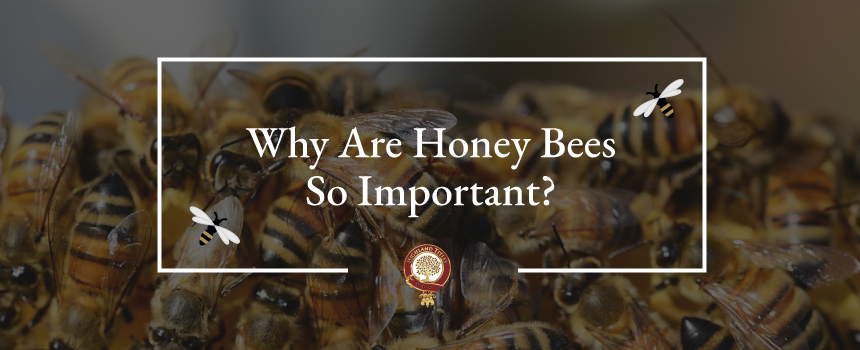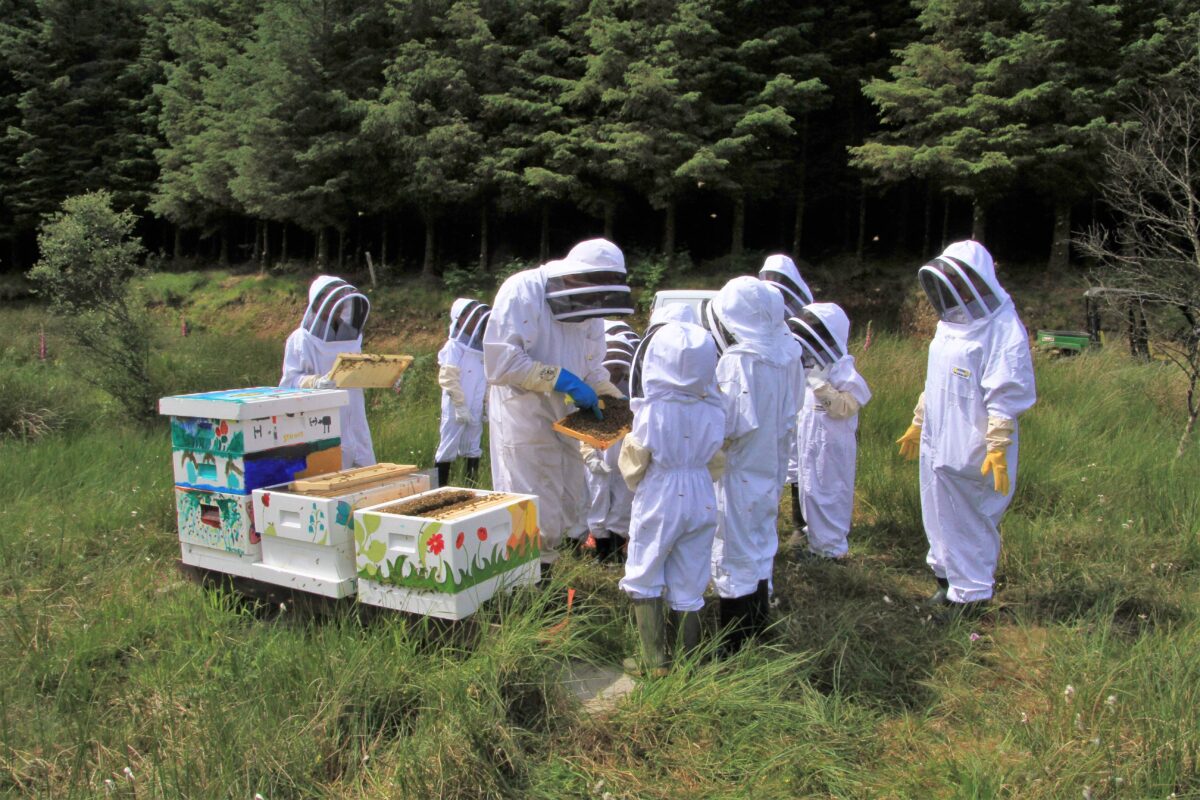Why Are Honey Bees So Important?

A wise man once said “If the bee disappeared off the face of the earth, man would only have four years left to live” – a line usually attributed to Einstein even though it was actually proclaimed by Maurice Maeterlinck, a Belgium-based Nobel Prize winner. Now, despite its dramatic message, the quote is not totally daft and it seems plausible enough – if all bees were to die tomorrow, honey shortage would be the least of our problems.
What is the difference between Bumble Bees and Honey Bees?
In the UK alone, there are over 250 species of bee: there are 25 species of bumble bee, 224 species of solitary bee and 1 honey bee species. There are some significant differences between the different bee species, including their appearance, the type of flowers they prefer to visit, lifespan, hibernation pattern, and more.
| Characteristic | Solitary Bee | Bumble Bee | Honey Bee |
| Appearance | Vary in size and appearance | Fat and furry | Small and slim |
| Nest Size | Do not live in colonies and the majority nest in underground burrows | Live in nest with 50 – 400 bees and mostly in the wild | Live in hives with between 20,000 and 60,000 bees, and are mostly looked after by beekeepers (but there are wild colonies) |
| Queen Bee | Do not have a queen | Queen lives for one year and it is the only to hibernate | Queen can live for four years and lives in the hive all year-round with many of her daughters |
| Honey-Produce | Do not produce honey | Only produce a small amount of honey-like substance and consume it themselves | Produce large amounts of honey |
| Pollination | They are fantastic pollinators: equivalent to 120 worker honeybees | Feed from different shaped flowers as they have different lengths of tongue | As they have shorter tongues, they prefer open flowers |
| Temperament | Non-aggressive, rarely sting and only females are able to do so | Only sting if aggravated and are able to sting more than once | Can be aggressive but they die after stinging, as their stinger gets stuck in the skin |
Independently from their differences, all bees play a critical role as pollinators and, unfortunately, the bee population is showing decline worldwide, especially honey bees. So, why should we be worried? Why are honey bees so important?
Your Favourite Food Is Dependent on Pollination by Honey Bees
One out of every three bites of food you eat is dependent on pollinators like the honey bee. Chances are that some of your favourite food is a result of pollination, such as avocados, asparagus, broccoli, squash, cucumbers, apples, pears, berries, kiwis, cherries, melons, and more! In the UK, there are over 39 commercial crops that are reliant on bees and even those that are not directly pollinated by honey bees still benefit from its presence, as they increase the biodiversity in the area, stimulating the crops.
Cattle Depend Partly on Honey Bees
Most fruits and many vegetables depend on bee pollination, including some of the most important plants used to feed livestock, such as clover and alfalfa. These are essential parts of cattle diets, which could be endangered without bees and pollination. So not only would your favourite fruits and vegetables be at risk but also the meat and dairy industry.
Honey Bees Are Essential to Farmers’ & Beekeepers’ Livelihoods
Honey bees and healthy crops are closely connected and honey bees play a critical role in the growth of crops. The growth of healthy crops is necessary not only for us to keep enjoying our favourite foods but also for farmers to maintain their livelihood. In fact, honey bees are so important to farmers that they often get beehives placed on their own farms to provide pollination for their crops!
Apart from farmers, there are over 29,000 individuals that rely entirely on honey bees in the UK: beekeepers, whose livelihood depends on honey harvesting and sale. However, the bee farming industry also plays an essential role in reversing the pollinator decline, through the provision of managed and targeted pollination services.
Wildflowers Are Dependent on Honey Bees
The UK countryside is well-known for its interesting and colourful wildflowers, an important element of our complex woodland. Did you know that approximately 80% of wildflowers in Europe are pollinated by bees? As one of the most important pollinators, honey bees are responsible for completing the wildflowers’ reproductive cycle, which means that without them, our countryside would quickly become less interesting and less beautiful.
Honey Bees Play a Role In Our Health & Lifestyle
The disappearance of honey bees would trigger an inevitable chain of events that could actually impact our health and nutrition. Losing these pollinators could lead to lower availability of crops, which are an integral part of our food intake and that provide essential micronutrients for human diets. Without these crops, the risk for increased numbers of people suffering from vitamin A, iron and folate deficiency would increase, affecting our health and nutritional intake.
Finally, honey bees play a significant role in the pollination of non-ingestible crops, such as cotton and flax, utilised in a lot of non-food products that we use in our day-to-day, like clothing, bedding, and more. In addition, the honey bee also produces other valuable substances other than honey, like beeswax, which is widely used in cleaning and beauty products.
How Highland Titles Supports Bee Conservation

At Highland Titles, we are doing our part to support bee conservation. We work closely with local schools to educate them on the importance of bees, pollination and their conservation. To do so, every year we buy brand new white hives and we gift them to local schools for the students to paint and decorate. Together with our partner, Webster Honey, we then visit the schools and give informative and educational talks to the kids.
During the summer, we hire buses to bring the kids to our Nature Reserve, dress them appropriately in little bee suits and show them where the hives are and how it all works.
And that’s why honey bees are important – they play a pivotal role in our ecosystems, our health and even our lifestyle. Along with our work with local schools, we also sustain our conservation work by installing habitat boxes and planting Scottish wildflowers – and you can get involved too, simply sponsor a habitat box!
If you have sponsored a habitat box already, there are other things you can do to support bee conservation in your own home. Read our article on “How Can I Help Bumblebee Conservation?” and continue to share the buzz!
Sources
[1] The UK Bee Population (2017) by Emma Downing and Nikki Sutherland
[2] The Bee Cause – Help Save Bees (2018) by Friends of the Earth
[3] Why Bees Are Important (2018) by sustainweb.org
[4] Why Are Honey Bees Important to Crops and Farmers? (2018) by Bees Matter
[5] The Differences Between Bumblebees and Honeybees (2018) by Bumblebee Conservation Trust
[6] About Solitary Bees (2018) by Grow Wild
[7] What is Bee Farming? (2018) by Bee Farmers Association
What you should do next...
- Browse our plots to claim your title of Lord or Lady of the Glen
- Discover the masjetic Kilnaish Estate
- View our fun gifts and accessories, inspired by the Scottish Highlands





